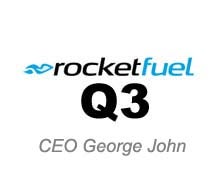 Last week, AdExchanger.com noted in its daily news round-up that ad network Rocket Fuel had reported strong growth in revenues for 2010. Read the release.
Last week, AdExchanger.com noted in its daily news round-up that ad network Rocket Fuel had reported strong growth in revenues for 2010. Read the release.
In a brief email conversation with AdExchanger.com since then, Rocket Fuel CEO George John has provided insights on how start-up innovation may be stifled by current U.S. government revenue reporting requirements for public companies. He also responds to comments by some who thought Rocket Fuel revenues should be reported either more openly, or not at all. John wrote:
“I think the negative reaction has come from public company CEO’s who are under much fiercer reporting requirements from the SEC and Sarbanes-Oxley. We’re not public yet so I have no direct opinions on these disclosure regulations as a CEO. But, as an investor, I like the notion that information should be available to all investors equally (which is the spirit of SEC Fair Disclosure regulation) and that executives who are in a position to benefit from misleading investors also are put in a position to suffer if they are caught (which was part of the spirit of SarbOx).
When entrepreneurs and startup investors get together to talk about factors restricting America’s innovation economy, one thing they identify consistently is what they see as unintended consequences of SarbOx, which seems to have had the effect of skewing the playing field even further towards large mega-corporations, as small companies now find it significantly more expensive to go public and maintain life as an independent company. This is unfortunate because it throttled back an engine that powered innovation, jobs and economic growth. Today, fewer startups are being funded, and those that get funded are often launched with a tiny investment. They just try to get bought quickly by a larger player, versus building a great company. This merger/acquisition ‘exit’ path always stalls and sometimes kills the startup’s innovation as it integrates into its corporate parent, so it’s a loss for our economy that more companies can’t remain independent as they mature.”
By John Ebbert









